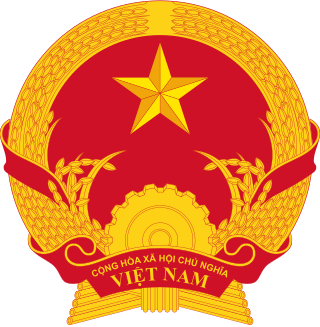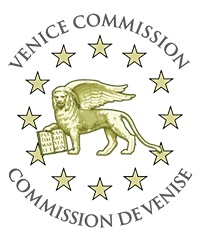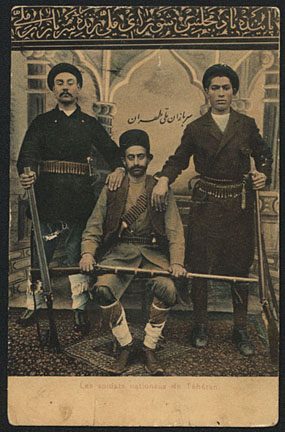
A constitution is the aggregate of fundamental principles or established precedents that constitute the legal basis of a polity, organisation or other type of entity and commonly determine how that entity is to be governed.
A head of state is the public persona who officially embodies a state in its unity and legitimacy. Depending on the country's form of government and separation of powers, the head of state may be a ceremonial figurehead or concurrently the head of government and more.
George Graham Winterton was an Australian academic specialising in Australian constitutional law. Winterton taught for 28 years at the University of New South Wales before taking up an appointment of Professor of Constitutional Law at the University of Sydney in 2004.

The Guardian Council, is an appointed and constitutionally mandated 12-member council that wields considerable power and influence in the Islamic Republic of Iran.

The Fifth Republic is France's current republican system of government. It was established on 4 October 1958 by Charles de Gaulle under the Constitution of the Fifth Republic. The Fifth Republic emerged from the collapse of the Fourth Republic, replacing the former parliamentary republic with a semi-presidential system that split powers between a president as head of state and a prime minister as head of government. De Gaulle, who was the first French president elected under the Fifth Republic in December 1958, believed in a strong head of state, which he described as embodying l'esprit de la nation.

The Constitution of Pakistan, also known as the 1973 Constitution, is the supreme law of Pakistan. Drafted by the government of Zulfikar Ali Bhutto, with additional assistance from the country's opposition parties, it was approved by the Parliament on 10 April and ratified on 14 August 1973. The Constitution is intended to guide Pakistan's law, political culture, and system. It sets out the state's outline, the fundamental rights of the population, the state's law and orders, and also the structure and establishment of the institutions and the armed forces. The first three chapters establish the rules, mandate, and separate powers of the three branches of the government: a bicameral legislature; an executive branch governed by the Prime Minister as chief executive; and an apex federal judiciary headed by Supreme Court. The Constitution designates the President of Pakistan as a ceremonial Head of State who is to represent the unity of the state. The first six articles of the constitution outline the political system as federal parliamentary republic system; as well as Islam as its state religion. The Constitution also encapsulates provisions stipulating the legal system's compliance with Islamic injunctions contained in the Quran and Sunnah.

The president of the Democratic Republic of the Congo, is the head of state of the Democratic Republic of the Congo and commander-in-chief of the armed forces.

The Constitution of the Socialist Republic of Vietnam is the current constitution of Vietnam, adopted on 28 November 2013 by the Thirteenth National Assembly, and took effect on 1 January 2014. It is the fourth constitution adopted by the Vietnamese government since the political reunification of the country in 1976.

Prior to the Supreme Court's decision in Obergefell v. Hodges (2015), U.S. state constitutional amendments banning same-sex unions of several different types passed, banning legal recognition of same-sex unions in U.S. state constitutions, referred to by proponents as "defense of marriage amendments" or "marriage protection amendments." These state amendments are different from the proposed Federal Marriage Amendment, which would ban same-sex marriage in every U.S. state, and Section 2 of the Defense of Marriage Act, more commonly known as DOMA, which allowed the states not to recognize same-sex marriages from other states. The amendments define marriage as a union between one man and one woman and prevent civil unions or same-sex marriages from being legalized, though some of the amendments bar only the latter. The Obergefell decision in June 2015 invalidated these state constitutional amendments insofar as they prevented same-sex couples from marrying, even though the actual text of these amendments remain written into the state constitutions.

The Venice Commission, officially European Commission for Democracy through Law, is an advisory body of the Council of Europe, composed of independent experts in the field of constitutional law. It was created in 1990 after the fall of the Berlin Wall, at a time of urgent need for constitutional assistance in Central and Eastern Europe.
The Fundamental Law of Hungary, the country's constitution, was adopted by parliament on 18 April 2011, promulgated by the president a week later and entered into force on 1 January 2012. It is Hungary's first constitution adopted within a democratic framework and following free elections.

The Persian Constitution of 1906, was the first constitution of the Sublime State of Persia, resulting from the Persian Constitutional Revolution and it was written by Hassan Pirnia, Hossein Pirnia, and Esmail Momtaz, among others. The Constitution was also in effect during Pahlavi Iran. It divides into five chapters with many articles that developed over several years. The Quran was the foundation of this constitution while the Belgian constitution served as a partial model for the document.
In most legal systems of the Spanish-speaking world, the writ of amparo is a remedy for the protection of constitutional rights, found in certain jurisdictions. The amparo remedy or action is an effective and inexpensive instrument for the protection of individual rights.

The primacy of European Union law is a legal principle establishing precedence of European Union law over conflicting national laws of EU member states.

Law is a set of rules that are created and are enforceable by social or governmental institutions to regulate behavior, with its precise definition a matter of longstanding debate. It has been variously described as a science and as the art of justice. State-enforced laws can be made by a group legislature or by a single legislator, resulting in statutes; by the executive through decrees and regulations; or established by judges through precedent, usually in common law jurisdictions. Private individuals may create legally binding contracts, including arbitration agreements that adopt alternative ways of resolving disputes to standard court litigation. The creation of laws themselves may be influenced by a constitution, written or tacit, and the rights encoded therein. The law shapes politics, economics, history and society in various ways and serves as a mediator of relations between people.
Johann van der Westhuizen (born 26 May 1952 in Windhoek, South West Africa is a former judge of the Constitutional Court of South Africa. Before his judicial appointment, he was a professor at the University of Pretoria Faculty of Law and the founding director of its Centre for Human Rights.

The rule of law is the political philosophy that all citizens and institutions within a country, state, or community are accountable to the same laws, including lawmakers and leaders. The rule of law is defined in the Encyclopedia Britannica as "the mechanism, process, institution, practice, or norm that supports the equality of all citizens before the law, secures a nonarbitrary form of government, and more generally prevents the arbitrary use of power." The term rule of law is closely related to constitutionalism as well as Rechtsstaat and refers to a political situation, not to any specific legal rule.

The Constitution of Kenya is the [constitution|supreme law] of the Republic of Kenya. There have been three significant versions of the constitution, with the most recent redraft being enabled in 2010. The 2010 edition replaced the 1963 independence constitution. The constitution was presented to the Attorney General of Kenya on 7 April 2010, officially published on 6 May 2010, and was subjected to a referendum on 4 August 2010. The new Constitution was approved by 67% of Kenyan voters. The constitution was promulgated on 27 August 2010.
Constitutionalism is "a compound of ideas, attitudes, and patterns of behavior elaborating the principle that the authority of government derives from and is limited by a body of fundamental law".

Tom Ginsburg is the Leo Spitz Distinguished Service Professor of International Law and Professor of Political Science at the University of Chicago and a member of the American Academy of Arts and Sciences. He is primarily known as a scholar of international and comparative law, with a focus on constitutions and a regional specialty of East Asia.













